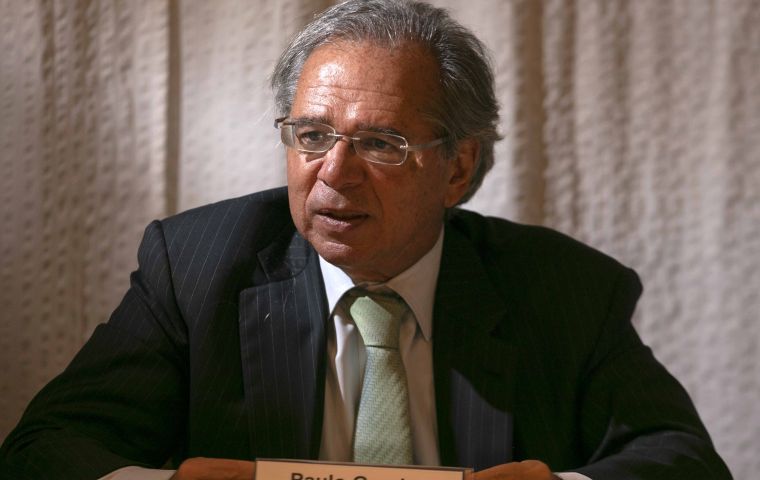MercoPress. South Atlantic News Agency
“Mercosur needs urgent modernization” and Brazil can't be prisoner of an institutional accord
 Economy minister Paulo Guedes.
Economy minister Paulo Guedes. Brazilian Economy minister Paulo Guedes told Congress that Mercosur no longer has for Brazil the same importance it had when it was launched, a kind of jumping board for the country to advance in competition terms.
According to a report from the official Brasil Agency, the block is not fulfilling its expectations, although it still can be considered “a valid and important tool”. What is urgently needed is the modernization of the trade block. Guedes made the statements on Mercosur during an open session of the Senate to discuss the performance, expansion and modernization of the block made up of Argentina, Brazil, Paraguay and Uruguay.
In the last thirty years world trade has grown significantly and helped 3,7 billion people climb out of poverty and misery, increasing per capita income. While here in South America, “we who were pioneers in the creation of great trade integrated blocks, have stayed behind”, argued minister Guedes.
Mercosur yes was a “great success” as a platform to increase regional integration and launch the Brazilian economy to the global scenario. “It was a kind of jumping board for Brazil to integrate into the world economy”, pointed out Guedes recalling that between 1991 and 1998, Mercosur participation in Brazilian overall trade climbed from 9% to 18%, but then it started to drop quite dramatically.
“At the beginning, it was a cohesion force for our integration, but then it started to slip and now is 6%/7%, less than half that when it took off. Mercosur is certainly not up to expectations and following a strong take off with regional integration, it has been losing significance...”
However Guedes said he still considers Mercosur a valid and important platform, but we must modernize the tool. And modernizing means cutting the common external tariff, AEC, because we are far above the integrated world standards. In the world, the average is 4%, maybe 5% and in Mercosur, 13%, insisted the Brazilian minister about the ongoing objections from Argentina and its policy of protecting domestic industry and jobs.
Earlier this year Brazil proposed to the Mercosur block a first review of the AEC, which averaged 13,4%. Initially, the proposed reduction was 20% of the tariff, but later the Brazilian economic team, given some domestic complaints brought it down to 10% in 2021 and another 10% in 2022 of the 13,4%.
Another issue in the debate is the proposal to make trade negotiations of the block with other countries more flexible, by modifying some terms of the Mercosur founding Asuncion Treaty, to facilitate the demand that negotiations must be addressed jointly by the four members.
“We do not want the Mercosur consensus clause to become in fact a veto clause, which means that if any of the four members refuses to move, the others must abide. We think Brazil is too big with huge potential and enormous challenges. We can't be prisoners' of an institutional accord that refuses to modernize and limits trade opportunities. Brazil can't become a prisoner of a protectionist and backwards philosophy, rather it must act to the contrary”, emphasized Guedes.
Finally and according to Brasil Agencia, Guedes told Senators that Mercosur in its current state does not satisfy the necessities of Brazil and that in discussions with the Argentine government, if no agreement on modernization is reached, “the tool obviously does not make sense for us”.
The Brazilian stance has strong support from the current Uruguayan government, while Argentina remains locked in its protectionist attitude and has landlocked Paraguay, which depends mostly on Argentina to access the world, reluctantly on its side.




Top Comments
Disclaimer & comment rulesCommenting for this story is now closed.
If you have a Facebook account, become a fan and comment on our Facebook Page!